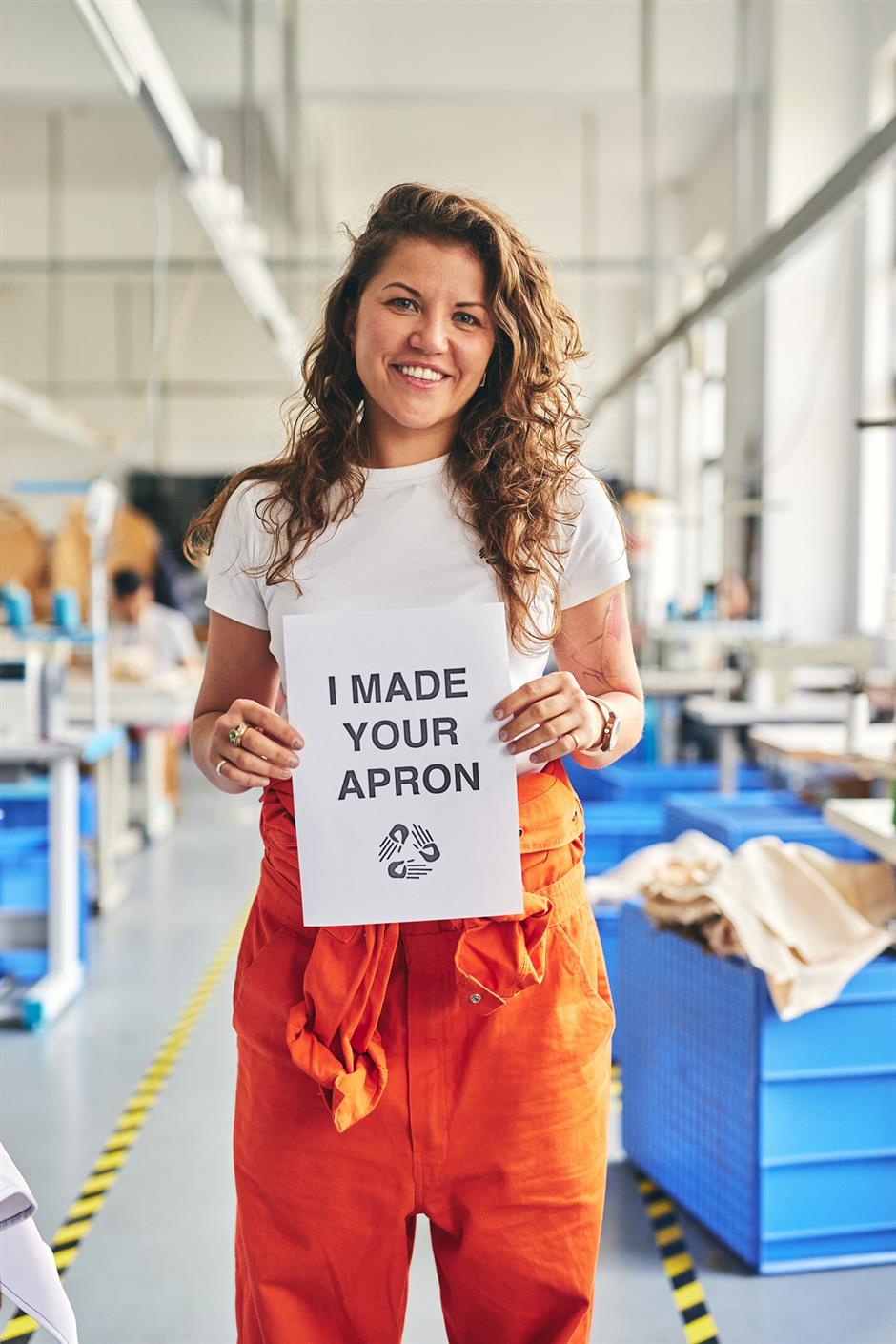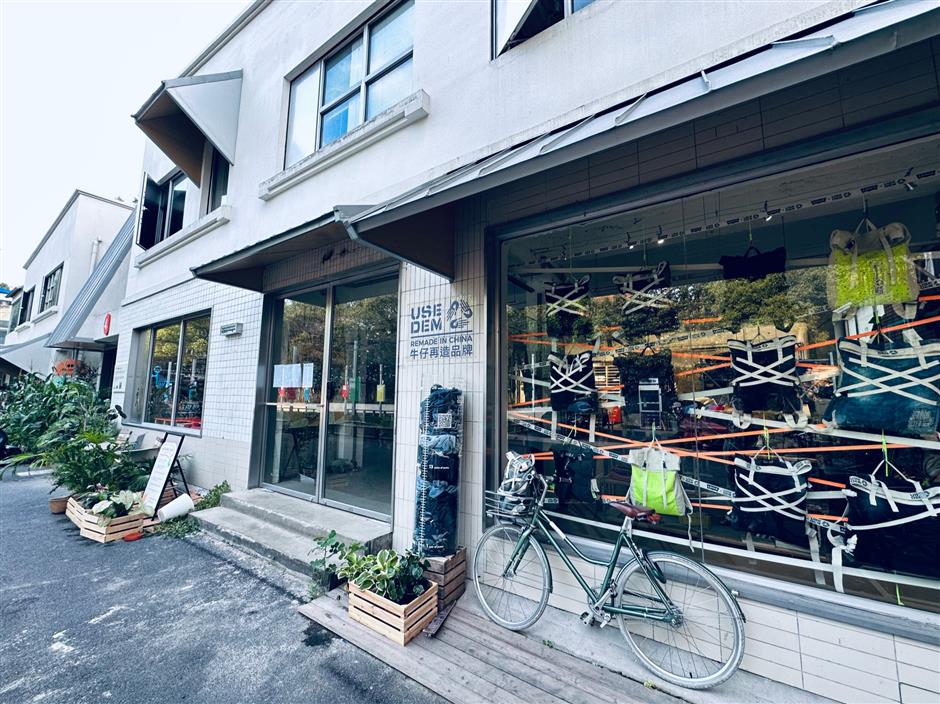The mission of an ecopreneur and upcyclist
Editor's note:
The road to being a successful female entrepreneur – be it a restaurant owner, a designer, a gallery owner or a retailer – can be bumpy. In this series, "She Power," we talk to women from different countries and different backgrounds about their experiences and stories of setting up businesses in Shanghai. One thing these amazing women all have in common – they all yearn to build a brand that does good, that gives purpose and fulfillment, and even a palpable sense of joy.

Xenia Sidorenko is founder of upcycle brand UseDem, with the aim to eliminate textile waste and save drinking water.
Q: Before we talk about your company, would you please introduce yourself?
I'm a fashion designer from St Petersburg, Russia. I moved to Shanghai in 2011 to work closely with local denim factories. Through 13 years' experience of mass production in the textile industry, I've transformed my own understanding of a designer mission in the 21st century, where products should be designed to be sustainable.
Q: Why, after living in Shanghai for a few years, did you decide to strike out on your own to build up a business ?
Through working closely with denim factories, I've witnessed firsthand the mass production of denim jeans for the ever-growing market across the world, and the negative impact the industry has on the environment. I founded in 2015 an upcycle brand – UseDem.
We take pre-existing fabric and produce high-quality, recycled and upcycled products in a sustainable process. In one year, UseDem saves approximately 1,000 pairs of jeans from landfills, the equivalent to saving almost 3.8 million liters of water.
We source used and discarded jeans from individuals and factories, upcycling them into unique, beautiful and marketable products. We offer our B2C customers the chance to take a pair of their own jeans and remake them into a backpack unique to them.
We have collaborated with brands to make exclusive bags and accessories from their waste and denim inventory. We have conducted corporate workshops and seminars on sustainability and implementing a zero-waste textile strategy for companies.
Our bags and accessories are made in partnership with Home Sweet Home, who operate their factory on the outskirts of Shanghai. They are a not-for-profit organization which provides training and employment for Chinese people with special needs or disabilities.
At UseDem, we are challenging the sometimes negative connotations of the term "Made in China" as our products are "Remade" in China.

UseDem sources used and discarded jeans from individuals and factories, upcycling them into unique and marketable products.
Q: What makes Shanghai's business environment so remarkable?
I don't speak Chinese and that didn't stop me from having my sustainable brand for eight years, moreover to become a popular and respected brand in China. I believe it is a special Shanghai way to accept different cultures and be open to innovative products and movements.
Q: What were you trying to bring to the local community?
Without awareness, there is no progress in sustainable development and we believe that the most important and first step to push sustainable products in the Chinese market is to let more people know about natural crises and how we depend on natural resources.
That is why we are creating content to raise the awareness of local society, and running workshops and lectures where we let people discover their creativity and learn how to fix clothes and how to upcycle unused products into useful ones.
We wish more brands would communicate on this topic with clients and their audience and then one day it would be our way of our living, being responsible and respectful of nature.
We make our products in cooperation with an inclusive factory to create jobs for those who are in need.

UseDem produces their products in cooperation with an inclusive factory to create jobs for those in need.
Q: What are the biggest challenges setting up a business here? How do you stay motivated?
We represent the other side of success – the success of living in peace with nature and with yourself. Our minimalist lifestyle is the opposite of "buy more, buy fast, buy cheap."
We are pioneering this movement in China – that's the biggest challenge.
In 2015, no one had a clue what I was doing. Today, things are better and we are honored to be one of the first and the one who has survived through all those years.
Q: What moment made you most proud?
Our business model is very different from the traditional fashion industry way. When I tell people how we rescue fabrics from being wasted and we make products with disabled people, I see the trust in people's eyes and it makes me proud about what we are doing.
After lockdown in Shanghai, quite a lot of companies closed. UseDem not only survived but we recovered fast and consistently grew, which makes me very proud and thankful for my team for their faith in UseDem.

The UseDem studio is hidden inside 345 Xinhua Road.
Q: What are you working on?
I dream of creating a repair – upcycling worldwide chain to create trendy clothes out of clothes from the last season to help those in the older generation who are skilled, and have a small atelier to get connected with the young generation who want to be trendy so they don't just buy new clothes and throw away the old ones.
Q: Who is a female role model who inspires you?
Catherine the Great. She was the reigning empress of Russia from 1762 to 1796. She came to power after overthrowing her husband, Peter III. Under her long reign, inspired by the ideas of the enlightenment, Russia experienced a renaissance of culture and sciences, which led to the founding of many new cities, universities, and theaters. I feel connected to her and the fact she was a foreigner in Russia but dedicated her life to a country she didn't belong to at first.
Q: Do you have any advice for women entrepreneurs?
Ask for help and never go it alone. The journey will be hard and it is always better to have a good team to help through all the ups and downs.
















